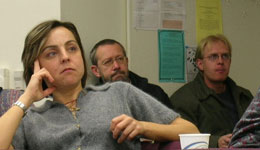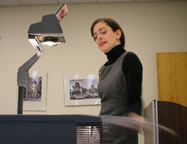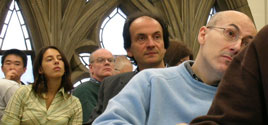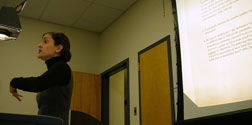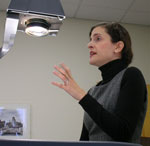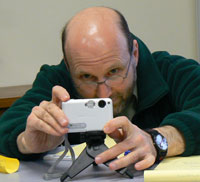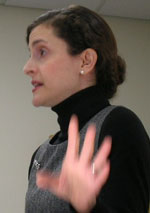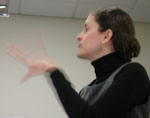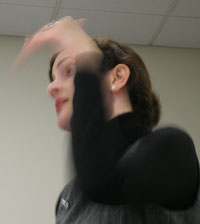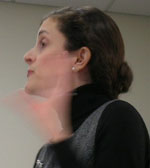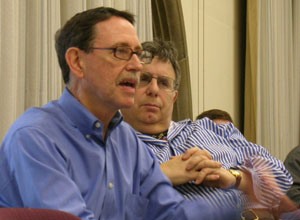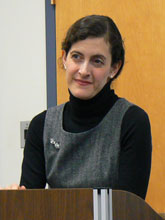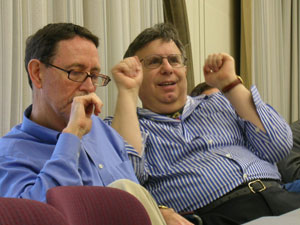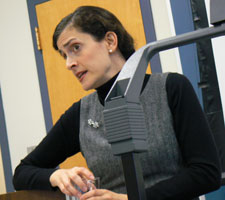
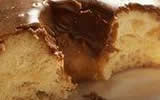
![]()
::: postdoc fellowships
::: senior fellowships
::: resident fellowships
::: associateships
![]()
being here
::: visiting
::: the last donut
::: photo album
::: center home >> being here >> last donut? >> 14 November 2006 |
Tuesday, 14 November 2006 Sometime over the centuries it became clear that we needed to strengthen our account of how evidence supports science. The original ideal had been described by Francis Bacon in the 17th century. He spoke of evidence carefully collected and organized as if by masons patiently building a tower, stone by stone. Yet as scientific theories became more abstract, the distance between them and our experiences grew so great that no accretion of stones could fill the gap. Only an imaginative leap to a distant hypothesis could secure the theory, whose correctness would then be known from the truth of its consequences. Today's speaker assured us that our lore holds that this time came about in the 19th century in Britain. For then the distant concepts of electromagnetic fields and aethers and minute atoms moved from speculation to established science. And she was here today to tell us that this lore was just a big myth. Laura Snyder has been visiting in my Department of History and Philosophy of Science for a term. She is a philosopher who has felt the powerful pull of history and the real need to understand the great debates of the past, which formed the concepts and categories we now take for granted. She speaks of the 19th century heroes, the philosopher-scientists, John Herschel and William Whewell, with a familiarity born of the deepest immersion in their writings. So here is Herschel writing warmly about hypotheses. The words are plain enough. Why isn't this the method of hypothesis? It's all in the context. Laura zooms out to give the fuller quotation and it becomes clear that Herschel's apparent approval of a leap to hypothesis is powerfully hedged and qualified. Any why? The influence of Bacon and his insistence on a cautious ascent to laws remains strong. Herschel's great work, his Preliminary Discourse, proudly displays a bust of Francis Bacon on its frontispiece and quotes approvingly from Bacon's gradualism. This close textual analysis continues. There's more Herschel. There's Whewell. There's Whewell on Herschel. The overall direction of the current is quite clear, but there are so many little eddies and textual turbulences that my compass is starting to spin. Laura is speaking quickly, as if there is a great urgency to move along, and the transparencies are hurried over the glowing screen. I find myself listening less to the details of the debate and more to the words. I am enjoying the imaginative elegance of the phrasing of these nineteenth century writers. We would say "hypothesis." They say "anticipations of nature" and I glimpse an over-eager investigator taking an ill-advised leap, just as they intended me to. Laura's analysis is building to its climax. "Bad History. Bad Philosophy. And a Bad Guy." she intones. We've seen the bad history. The bad philosophy is an impoverished picture of the cautious inductive ascent that would not allow room for the prudent and controlled hypotheses of a cautious investigator. And who is to blame? Those who have heard Laura speak before have no doubt at whose door the blame will be laid. It is that all-purpose villain of 19th century philosophy of science, John Stuart Mill. His famous methods were a narrowing of those of Bacon and Herschel's. They now ruled out the introduction by inductive means of Herschel's waves of electromagnetism in analogy with waves of sound and water. That distorted the older tradition in induction by making its scope seem small and unimaginative, and relocated Herschel's prudent use of hypothesis into an incautious, speculative tradition. Laura's rapid delivery paid the dividend of an early close to the talk. Is that OK? I reassured her that no one ever complains that a talk is too short! After the usual formalities--more bagels and an umbrella--we could turn to question time. Sandy Mitchell came first, her eager hand waving while others were still finding their seats. How bad was the bad guy? Wasn't Mill right to insist on greater caution? Wasn't Herschel willing to entertain supernatural causes? Good, I thought. Mill-bashing has become too easy nowadays. Yes, Laura conceded, there was something there. But Herschel did later retract his support of supernatural causes. The discussion continued, through aethers and Whewell's ideas on consilience of induction and much more. I eventually inserted myself into the discussion and began the little speech that would pass for a question. So in the 19th century the investigator was more of an automaton, following a safe method to an assured result, and chastized for unwarranted leaps; whereas the 20th century scientist is praised for making just such leaps as the highest form of creativity. What changed, I wondered? It was clear from Laura's smile that I had tripped the lever and an energetic flood of disputation was about to pour forth. No, no. The 19th century theorists saw great creativity in science. Indeed, on the memorable occasion in 1833 when Whewell coined the term "scientist," it was exactly because of its strong analogy to "artist." All these thoughts were swept into an energetic discussion, with questioners interjecting on questioner, and urgent points that just had to jump the speaker to the head of the line. Satisfied with the mayhem she had wrought, Laura finally brought us to order with an announcement "Now I'd like to say something." John D. Norton Laura Snyder |
